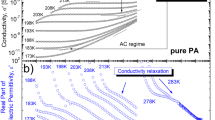Abstract
AN enhanced diffusion process occurs when an electric field is superimposed on a diffusion experiment which is being carried out with a system composed of chemically interacting electrolyte species1,2. This phenomenon, known as electrodiffusion, resembles ordinary diffusion in its phenomenological manifestations. The process can be described mathematically by a differential equation entirely similar to Fick's second law:  where c, t and De represent respectively the concentration, time and the electrodiffusion coefficient, the characteristic parameter of the process.
where c, t and De represent respectively the concentration, time and the electrodiffusion coefficient, the characteristic parameter of the process.
This is a preview of subscription content, access via your institution
Access options
Subscribe to this journal
Receive 51 print issues and online access
$199.00 per year
only $3.90 per issue
Buy this article
- Purchase on Springer Link
- Instant access to full article PDF
Prices may be subject to local taxes which are calculated during checkout
Similar content being viewed by others
References
Mysels, K. J., J. Chem. Phys., 24, 371 (1956).
Lamm, O., Acta Chem. Scand., 10, 1132 (1956).
Scholten, P. C., and Mysels, K. J., Trans. Farad. Soc., 56, 994 (1960).
Eigen, M., Z. Physik Chemie, N.F., 1, 176 (1954).
Longsworth, L. G., Chem. Rev., 30, 323 (1942).
Author information
Authors and Affiliations
Rights and permissions
About this article
Cite this article
BREUER, M. Isotope Separation by Electrodiffusion. Nature 194, 281–282 (1962). https://doi.org/10.1038/194281a0
Issue Date:
DOI: https://doi.org/10.1038/194281a0
Comments
By submitting a comment you agree to abide by our Terms and Community Guidelines. If you find something abusive or that does not comply with our terms or guidelines please flag it as inappropriate.



